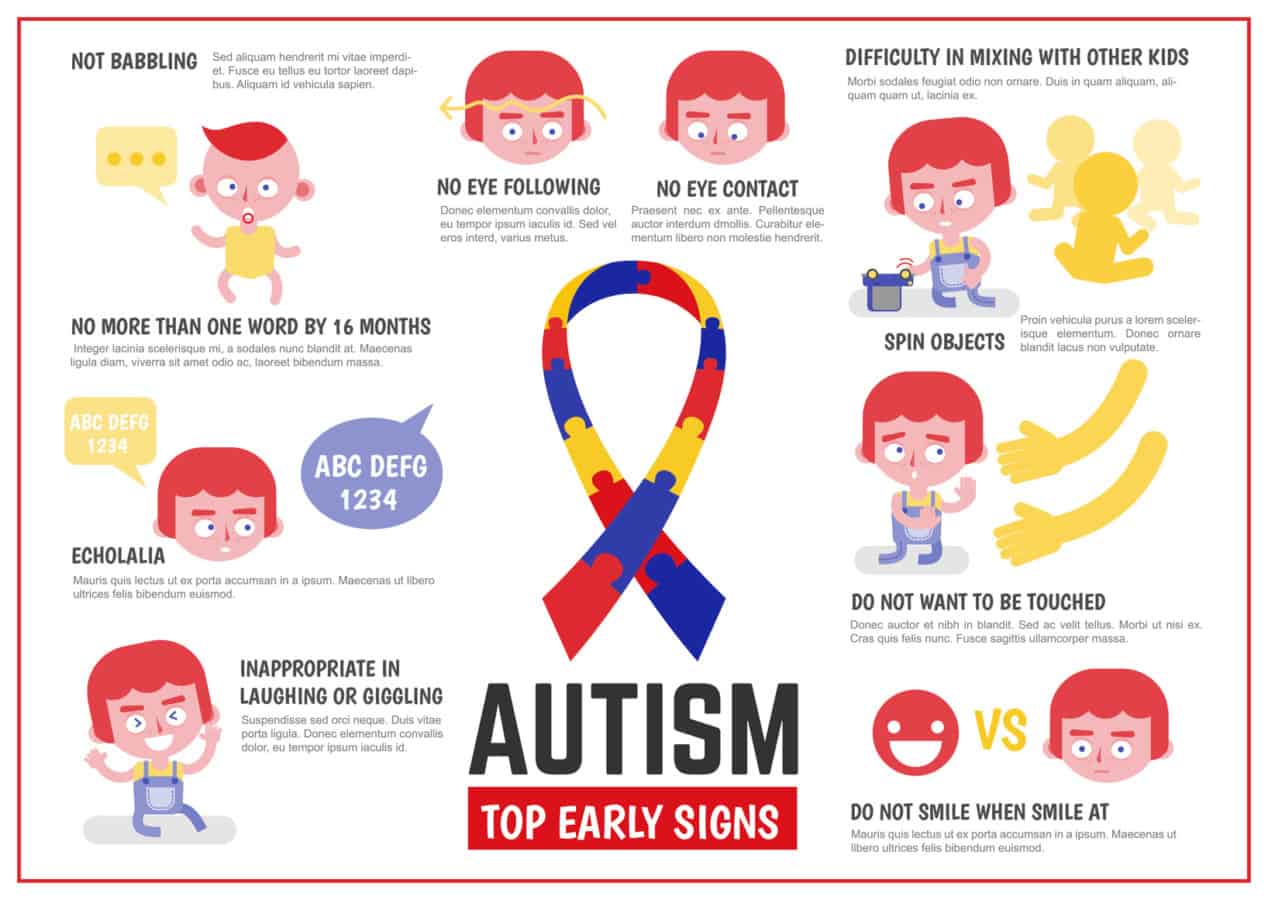Autism spectrum disorder (ASD) is not as mysterious as it used to be ten or twenty years ago. Now, we better understand the spectrum, and with that understanding comes empathy and support. Children on the autism spectrum see and process the world differently than children who don’t.
They may also have a more challenging time socializing and understanding social cues than other children. Without knowing what autism is or how to stop the signs, these children can often end up with unfair expectations put on them by parents, teachers, and their classmates.
As the name suggests, autism spectrum disorder exists on a spectrum of different behaviors and things that a child can or may have a more challenging time doing than most, including auditory processing, speaking verbally, and communicating. How can you know when your child might have autism?
There are some classic signs, and once you get a diagnosis, you can help your child better interact safely and comfortably.
7 Frequent Behaviors That Can Reveal a Child on the Autism Spectrum
“Autism is a severe neurodevelopmental disorder that is characterized by social withdrawal, by repetitive behaviors and by some kind of focal attention in its classic form. Basically, it’s an inability to relate to others.” – Harvey V. Fineberg
1. A child on the autism spectrum often has difficulty responding appropriately
Children not on the autism spectrum often begin interacting with their parents and the world around them almost immediately. They respond to voices, and they track movement with their eyes. Babies that have autism, however, may have difficulty interacting and responding to interaction. If your child has autism spectrum disorder, you can consider enrolling them in a therapy center. This can help them better understand and learn how to interact with different people.
A child with autism may not respond to the sound of their parent’s voice or words and may avoid eye contact.
2. Verbal delays
Babies begin babbling before they start learning to speak. Before they hit the one-year mark, most children will begin to make noises with their mouths as a form of communication. Children with autism will tend to have delayed development when it comes to verbalizing and babbling.
If your child isn’t reaching the same milestones when it comes to babbling or even talking as the children around them, they may be considered for diagnosis with autism.
3. Difficulty socializing
As your children grow from a baby to a toddler, they may have difficulty socializing with the other kids or even socializing with their parents. Most children show an interest in interacting with other people. Children with autism will be disinterested or may find interacting with people, especially strangers, complex and overwhelming. Autism can affect how children understand socializing. It may not be that they don’t want to – they don’t know how.
Autism can affect how children understand socializing. It may not be that they don’t want to – they don’t know how.
 4. Self-soothing behaviors
4. Self-soothing behaviors
This behavior is called ‘stimming,’ and it’s not a bad thing and shouldn’t be discouraged as long as it is not self-destructive or harmful to the child or others. Children with autism have trouble verbalizing their feelings the way other children might be able to do. This results in self-soothing behavior. An upset child who needs to calm down may take to rocking back and forth.
A happy child may express that feeling by wagging their hands or flapping their arms. Self-soothing helps children deal with their emotions at their own pace.
5. Lack of imitation
Most children learn through imitation. Children will repeat what their parents say and make the same kind of gestures that their parents do. They’re learning critical social skills through this act of imitation. A child with autism, on the other hand, may feel disconnected from their parents or other adults and children. They often do not respond to smiling by imitating the smile or waving back when waved to.
The autism spectrum affects how they understand and see the world. However, they may not know that you expect them to wave back.
6. Children with autism might not respond to their names
Children will often recognize and respond to their name by a year old. They’ll also understand the names of other household members, such as Mama and Dada. Children with autism may struggle to identify the name with themselves more. It may be a sign to be tested for autism if they’re not responding to their name when they reach a year old.
7. Disinterest in people
Generally, babies and children will look to adults for what to do. They’re interested in the people around them and take part in interacting with them – babbling, pulling hair, grabbing jewelry, responding to sounds and voices. Children with autism show a marked decreased interest in other people. They have very little interest in interacting with people around them and often avoid eye contact and nonverbal.
12 Self-Care Tips for Caregivers of Someone On The Autism Spectrum
You cannot take care of your child until you learn how to care for your own needs.

1. Move forward
When your child is diagnosed with autism, you might feel your world stops. Perhaps you knew something was going on but never expected autism. These are normal feelings. Your life will be different. Now that you understand what’s going on don’t stay in this stop mode too long. Now is the time to move forward. Get your child involved in autism therapies and activities right away. You’ll be managing your child’s appointments and treatment programs. Research to educate yourself so you can advocate for your child. Once you move forward in all these things, you’ll build a team of people who care about your child and want them to succeed as much as you do.
2. Get help for your marriage
Research shows parents of a child with autism spectrum disorder have increased marital conflicts, resulting in a loss of marital love and higher stress levels in the union. This points to the need to get help for your marriage if you are a caregiver of a child with autism. As a couple, get together with a counselor to discuss marital conflicts you’re experiencing because of autism. Keep your marriage a priority. Schedule weekly dates for some time alone together. Talk about other things besides autism.
3. Write in a journal
Journaling gives you a way to express your feelings about life. Journaling improves both mental health and physical stamina. There’s something cathartic about writing your deepest thoughts. It is a natural outlet and helps you get perspective. Whether you use a paper journal or an online site is up to you. Find quiet time during your day, sit down, and write.
4. Trust your gut
As a parent, you know your child best. When you’re in the midst of your child’s treatments, trust your gut about what is and isn’t working. It would be best if you learned everything you can about autism treatments. Ask good questions about why your child is receiving specific treatment. Find ways to implement these same strategies at home. Trust your gut and speak up if you don’t feel like your child is getting the care they need. You are your child’s best advocate.
5. Don’t hesitate to ask for help
As a parent of a child with autism, don’t hesitate to ask for help. If the people around you offer to help you, accept their help. Perhaps they offer to take your other kids to a park, cook a meal or fold your laundry. Don’t feel guilty about getting help. Parenting a child with autism is time-consuming. Having the extra help from friends may be necessary for a few years until your child’s treatments work.
6. Find someone to talk to
Be sure to have a trusted friend to talk to. You need someone who knows how you feel and what you’re going through. They don’t need to have all the answers for you, but having them listen can be an essential source of strength for you. Perhaps you have great support from your family.
7. Train family caregivers
Perhaps a couple of your relatives are especially in tune with your autistic child. Train them on how to work with your child. Teach them about autism so they can cover for you if needed. You may want to schedule times for them to come over to play with your child. These regular times build trust for your child and help them learn about your child. Family members who understand your child and can be short-term caregivers are essential for your peace of mind.
8. Take breaks
Parenting an autistic child is exhausting emotionally and physically. Getting some time away every day would be best to refresh your mind and body. While your child is at school, take a walk or get coffee with a friend. You should never feel guilty about taking a break. Remind yourself that you will be a better parent when you get some rest.
9. Get some rest
One of your most significant needs right now could be to rest. As a parent of an autistic child, you’re always on the go, heading to doctor appointments, treatments, or other activities. At home, it’s up to you to oversee your child’s care and routine. You need to schedule your rest because your life doesn’t allow for rest periods. When your child is at school, it could be the best time for you to take a nap or read a book. These brief rest periods help recharge your mind and body.
10. Check out after-school programs
Ask your child’s teacher or your child’s autism treatment center workers about after-school programs for autistic children. Many groups provide parental respite care for those with disabilities. Some school systems provide supervised after-care programs for kids with autism. These groups are fun for kids and help them with their social skills, plus give you more time at work or home.
11. Join a support group
When you’re a parent of an autistic child, it’s helpful to talk or listen to other parents going through a similar experience. Support groups are fantastic resources for information about services or activities for kids with autism. A support group will give you the encouragement, support, and comfort you need to get through the most challenging days of parenting your child.
12. Do not neglect self-care
It’s easy to allow autism to loom so largely. You barely take time for yourself. Self-care is crucial for you to stay healthy with so many demands. Don’t forget to schedule regular check-ups with your dentist or family doctor. Have a weekly spa treatment, get a massage to reduce stress, or have a weekly lunch appointment with friends. As a parent of a child with autism, you need to stay focused on your physical and mental health.

Final Thoughts on Raising a Child on the Autism Spectrum
If you suspect your child has autism, reading up and learning everything you can is best. Your child is just as intelligent and capable as any of the other kids – they need a little more help figuring out how to navigate the world around them! Getting them tested is a good plan, just in case any of the symptoms of autism could also be caused by something else.
Children with autism don’t always present the same way. Autism may present with more behaviors than others. Eith r way, your child looks to you for love, guidance, and support.


















